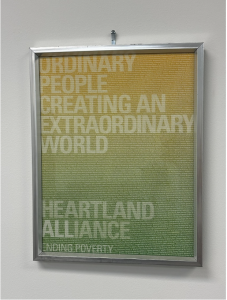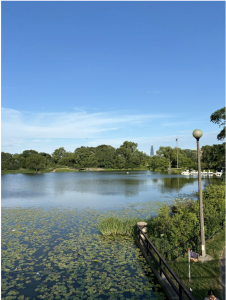 Today is my last day of my CAPS summer fellowship at Heartland Alliance. I look around the office. It’s quiet, a normal Friday morning as people mostly elect to work remotely before the weekend. Regardless, while everyone goes about their day, I sit here reflecting on some of the things I have learned this summer about both the work I have gotten to be a part of in refugee resettlement and as part of a non-profit at large in Chicago, IL.
Today is my last day of my CAPS summer fellowship at Heartland Alliance. I look around the office. It’s quiet, a normal Friday morning as people mostly elect to work remotely before the weekend. Regardless, while everyone goes about their day, I sit here reflecting on some of the things I have learned this summer about both the work I have gotten to be a part of in refugee resettlement and as part of a non-profit at large in Chicago, IL.
I once asked my supervisor the question, “how does Heartland approach the problems it wants to solve?”, and she gave me an answer I did not expect. For those that may not be familiar, Heartland Alliance’s mission is to resettle newly arrived refugees and immigrants in Chicagoland with the goal of helping them to become self-sufficient. My question about its “approach” could have yielded a number of answers.
Her answer to me was that Heartland takes a “strength-based approach”, something that helps each person newly arrived to the country to center, at least for a moment, on what things they bring to the table as a citizen in their community. Getting them to “feel confident in their skills, but also to feel confident that they are human beings who are here to contribute to society,” is the ultimate goal, something that can transcend any single service Heartland provides.
When we look at the broader implications of the strength-based approach that Heartland takes, it certainly places the refugees and immigrants in a position of accountability, or at least more accountability than one might think refugees should have. In fact, this is often a misconception: both from the outside world, and from inside Heartland (and organizations similar to it). When I asked my supervisor about common misconceptions she hears about her work, she spoke directly to this issue. “We are not here to save people”, she told me. “We are here to support. People save themselves, but they need our support to do it.” Sometimes staff and even newly arrived refugees see Heartland as an organization that can solve everything, which can affect the effectiveness of such a non-profit with limited resources. To be effective, it takes the newly arrived refugees to recognize that even in a new and often-times intimidating home, that they are still capable as human beings in society. They have to see themselves in the equation, and all of the autonomy, but responsibility that comes with it.
As I think about what I have learned this summer working in a non-profit, that may be the most important lesson. At Heartland, we are not here to save people; we can only support them in saving themselves. The best way to support them is to help them see not just their own strengths, but to see themselves as citizens in their community. Avoiding “mission drift”, where an organization loses sight of its goal (in this case supporting, not saving) is hard in refugee resettlement, a line of work that faces you with real people and consequences. But as an organization, Heartland does not have the means to address the root of the core challenges that refugees face in Chicago and the United States. However, it can support people, one by one, in facing those challenges, and give them the disposition to continue to overcome them long after we are supporting them with tangible means. Maybe in the future Heartland can exercise more influence on some of those core challenges. For now, it needs to focus on its strengths: supporting refugees with personalized services, all in the name of allowing them to create a better world for themselves. 
“Problem-posing education affirms men and women as beings in the process of becoming.” Paulo Freire, Pedagogy of the Oppressed
- by Aidan Obermueller, Heartland Alliance